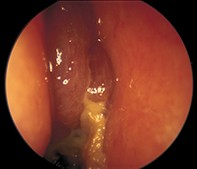Peer Reviewed
Feature Article Paediatrics
Snotty-nosed kids: what can we do to help?
Abstract
Blocked and discharging noses are a common presentation for clinicians who care for children. Modern management involves a progressive evaluation of relevant symptoms and signs with appropriate medical treatment. Surgical intervention may be of benefit when medical therapy fails.
Key Points
- A snotty nose in a child is a common presentation to the GP, and the problem is usually chronic. The most common causes are ‘the two As’: adenoids and allergy.
- Chronic rhinosinusitis may exist alone or in combination with adenoid hypertrophy or allergy.
- A clinical history and examination are the cornerstones of diagnosis, appropriate treatment and exclusion of atypical causes.
- Treatment for allergy is conservative, involving allergen avoidance as well as use of intranasal saline and/or corticosteroids and nonsedating antihistamines. Appropriate courses of antibiotics are given when infective rhinosinusitis is suspected.
- Referral to an ENT specialist is appropriate for children with likely adenoid enlargement, recurrent or chronic rhinosinusitis that has failed medical treatment, or unusual clinical findings.
Purchase the PDF version of this article
Already a subscriber? Login here.

